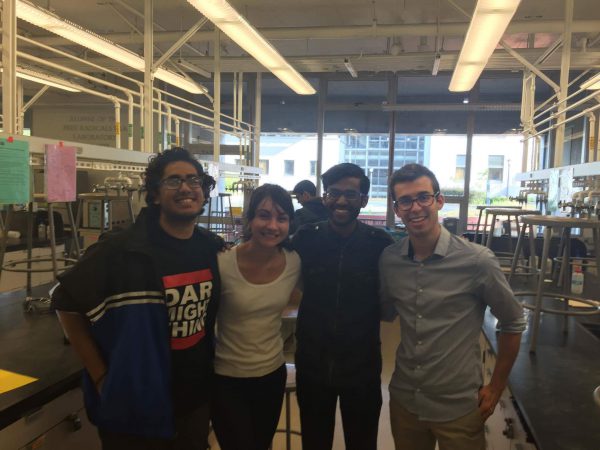Mentorship Creates Lasting Bonds

The science community really is a small world. Nick Watkins and Rocío Mercado met years ago in chemistry lab at at the University of California, Berkeley. Mercado mentored Watkins when she was a graduate student instructor and he was a second semester undergrad. While they have remained in close contact since, it wasn’t until they were contacted for this story that they realized they shared something in common: They are both Amgen Scholars who participated in the program at Caltech, years apart.
“Rocío had graduated by the time I was an Amgen Scholar [2018] and was working in Europe,” Watkins explains. “When I told her I was working at Caltech that summer, she said she was excited for me and told me to meet with Harry Gray, her undergraduate PI [principal investigator].”
It was nice to hear that he did it through the Amgen Scholars program and that the program is still sponsoring undergraduate summer research,” Mercado says, “as I had a very good experience in the program when I did it in 2012.”
Rocío helped me refine my seemingly uniform enthusiasm for every type chemistry to a field that encompassed my interest in applied biology and organic chemistry… -Nick Watkins (2018 Amgen Scholar)
Mentoring relationships like Mercado and Watkins’ are critical in shaping a scientific path. “Mentors have one of the most important roles in science, as it is their role to pass on not only their passion for science but also their attitudes and knowledge about science to their mentees,” Mercado says. “Good mentors are important because they lead to happier and more capable scientists.”
For Watkins, meeting Mercado was a formative experience in his career. He was in the process of declaring chemistry for a major and was trying to decide what kind of research he wanted to pursue. He began visiting Mercado during office hours to talk to her about what being a graduate student was like and the various research opportunities at UC Berkeley.
“Even after the semester finished, we continued to communicate via email, text, or in person during the following semester,” he recalls. “By the end of the fall of my sophomore year, Rocío helped me refine my seemingly uniform enthusiasm for every type chemistry to a field that encompassed my interest in applied biology and organic chemistry: abiological catalysis.”
But most importantly, he says, Mercado taught him about balance and becoming well-rounded as a scientist. “No one can be an expert at everything, but understanding why other people work on the problems they choose, the issues they face in their work, and the techniques they use to solve these issues can help us come up with better solutions to our own problems faster, as we will be able to make connections that we couldn’t have made otherwise,” Mercado says. “So to me, being well-rounded goes hand in hand with being a better scientist. Plus, it’s fun to learn new things!”
Watkins is now in the process of applying to graduate school and is considering returning to Caltech, among other options. He plans to pursue a graduate degree in chemistry working on organometallics. Mercado is working on de novo molecular design as a postdoctoral researcher in the Discovery Sciences department at AstraZeneca in Gothenburg, Sweden.
Both look back fondly at their time in the Amgen Scholar Program. “Being an Amgen Scholar at Caltech was the best decision I could have made for the summer before my senior year,” Watkins says. “Beyond developing my technical skills as a chemist, I cultivated meaningful connections with professors and colleagues, with whom I continue to keep in touch with.
Says Mercado: “I’m glad Nick had the experience to be an Amgen Scholar as I think he found it very valuable; I know I did, 7 years ago.”

